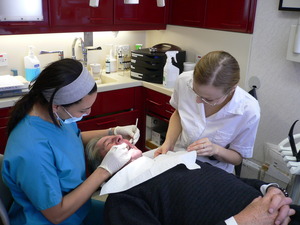Your teeth are covered with an outer protective and translucent shell called enamel. It helps protect the inner and more fragile components of your teeth such as dentin from chewing, biting, grinding, and keeps the teeth insulated from harsh temperature changes. When the enamel cracks or corrodes away, our inner teeth are exposed and at a higher risk of sensitivity, dental caries, and infections.
Enamel can disappear over time for a variety of reasons. Here are some of the most common causes and easy solutions to these problems.
Diet
When someone eats too many citric fruits, juices, or carbonated beverages and fails to practice proper oral hygiene care, the acid and sugars in these drinks can eat away at their teeth. Sugary foods are also a major culprit.
Solution: Avoid drinking soda and other carbonated beverages as much as possible. Sugary foods should also be eaten in moderation. If possible, try and wait a half-hour or so after eating or drinking before brushing. Sometimes when we brush right after eating, it can just spread the acid around and do more harm than good. As an extra measure, rinse your mouth out well with water before brushing.
Dry Mouth
A condition known as xerostomia, or dry mouth, can also cause erosion because a person lacks the proper amount of saliva in their mouths to prevent bacteria levels and fungi from overproducing.
Solution: At times I suffer from dry mouth. My dentist recommended I chew gum to get my salivary glands working. The more saliva present in our mouths, the better chance we have at keeping bad bacteria at bay.
Reflux
Reflux brings up excessive acids from the stomach, which erode the backsides of teeth, particularly those located in the far back of our mouths.
Solution: Antacids such as Tums can balance out the acidic pH from our stomach juices, eliminating heartburn. If the reflux is persistent enough, don’t hesitate to get medication. After a lifelong battle of acid reflux disease and failing to get on medication in time, my teeth are highly sensitive, much of my enamel is gone, and I developed a nasty tooth infection. I never want to relive that experience again and I regret not getting on medication sooner!
Medication
Medicines including aspirin contain high levels of acid, which is corrosive to teeth.
Solution: Ask your doctor if there is alternative medicine you can take, especially if you are prone to dental caries. If no other medication is available, you will just have to take extreme caution when brushing and caring for your teeth.
Genetics
If your family has a history of poor dental health, there may be a genetic factor.
Solution: Check to see if celiac disease runs in your family. This is a genetic condition that can cause enamel defects. I found out it runs in my family, unfortunately. If this is the case, you will have to alter your diet to avoid gluten-based foods. If celiac disease is not the case, you just need to take special care of your teeth and go above and beyond with brushing and flossing as frequently as possible.
Age
Normal wear and tear over time can thin your teeth’s enamel.
Solution: None. This is part of life, but it is still important to brush two to three times a day and floss daily, no matter how old we are.
Enamel is your main line of defense against cavities, sensitivity, and infection. Don’t let it waste way, and take proper care of your teeth and gums. A tooth infection is one of the worst pains you can deal with, believe me. I’d rather go through labor again than have another tooth problem!
